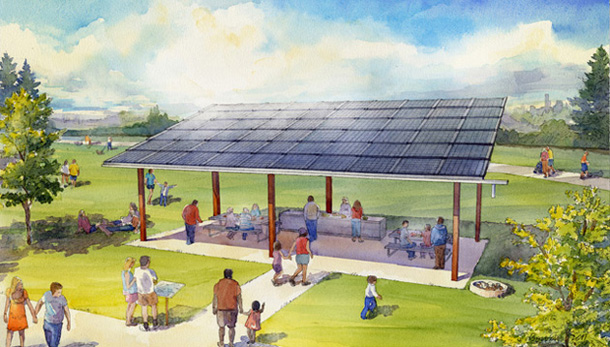They charge all day to provide cold, feeble light for a few hours after sunset. Whooptie-bang! We realize that they aren't using cutting edge components, but they do illustrate that when you need robust, reliable power to last the night (especially for computers, routers, wi-fi, televisions, DVDs, cable boxes, game consoles, dishwashers, laundry machines, CPAP machines, etc.), solar just doesn't cut it. It's supplemental at best. Whatever the reality, sustainability is so dreamy... Watch Out Whatcom for an increase in pitches just like this here, in the least-sunny corner of the country.
SEATTLEHENGE
posted by Stefan Sheransky, at Sound Politics
December 23, 2011
Seattle City Light mailed me a letter inviting me to "help build Community Solar today!"
"Community Solar" is Seattle's Sustainable Energy Future (today!) City Light has partnered with Seattle Parks and Recreation to build three new picnic shelters with roofs made of solar electric panels.
I know you're thinking, chuckling, perhaps: "Does Solar Energy Work in Seattle?" Yes, it does! City Light reassures us: Seattle City Light customers are installing solar equipment on their homes and businesses - and in greater numbers every year. While we are known for our cloudy skies, Seattle receives more sunlight than Germany, the world's leading solar market.So silly skeptical spoiler me to point out that City Light's current residential marginal rate (its highest) is $0.0956 / kWh. Your $600 solar unit generates $4.78 worth of electricity a year (probably less, assuming that city parks get a volume discount off residential). Your $600 solar unit will pay for itself in only 125 years (sustainably! today!)
This isn't "sustainable" under any non-delusional meaning of the word. It's a temple to the sun god, a modern-day Stonehenge.
City Light also wants to sell you solar units for your Mossback home. And never mind the cost, it's a good investment! Its lifetime per-kWh cost is only 3 times what you currently pay for electricity. But to save you the trouble of doing the math to understand how it's a good investment, I'll tell you that because it's a such good investment multiple government agencies will offer you incentives to invest your money this way. And you know that government agencies are savvy investors.
[I'll add as an aside that this isn't a sweeping damnation of solar technology itself. The cost is coming down and there are economically viable uses for solar today -- in places with more sunlight and less installed infrastructure. This particular project is far from that category.] ( ...more - the comments are priceless)



 RSS Feed
RSS Feed
